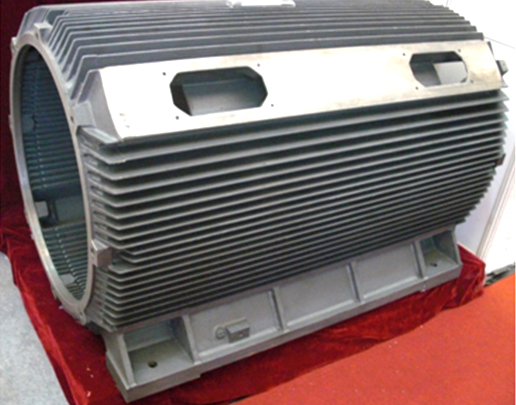As an important component of the motor, the selection of design, materials, and manufacturing processes for the Dalian motor casing has a significant impact on the performance and service life of the motor. With the continuous advancement of technology, motor casings will develop towards lightweight, high thermal conductivity, intelligence, and environmental friendliness to meet the increasing demand for use.
Regularly clean the surface of the motor housing to remove dust and dirt, maintain the cleanliness of the motor housing, and prevent dust and dirt from affecting the heat dissipation effect of the motor. Regularly check the sealing of the motor casing to ensure good sealing performance and prevent dust, moisture, and other pollutants from entering the interior of the motor. Regularly check the grounding protection of the motor casing to ensure reliable grounding and prevent motor leakage and electric shock accidents.
How to choose a suitable Dalian motor casing for specific application scenarios?
Choosing a motor casing suitable for a specific application scenario requires comprehensive consideration of multiple factors. The following are some key points:
application environment
Working temperature: In high-temperature environments such as metallurgy and forging workshops, it is necessary to choose a motor housing with good heat dissipation performance, such as aluminum alloy material, which has good thermal conductivity and can quickly dissipate the internal heat of the motor to prevent overheating. In low-temperature environments, the low-temperature toughness of materials should be considered to avoid damage to the motor casing due to brittleness caused by low temperatures. For example, cast iron has relatively poor toughness at low temperatures and may not be suitable for harsh cold environments.
Humidity and corrosiveness: In environments with humidity or corrosive gases and liquids, such as electroplating workshops and sewage treatment plants, motor casings with good corrosion resistance should be selected. The surface of aluminum alloy motor casing is prone to form dense oxide film, which has good corrosion resistance; Steel motor casings require special anti-corrosion treatment, such as galvanizing, coating with anti-corrosion paint, etc; Engineering plastic motor casings also have good corrosion resistance and are suitable for use in such environments.
Dust and impurities: In dusty environments such as mines and cement plants, the motor casing needs to have good dust prevention capabilities, and the protection level should not be lower than IP5X. At this point, the sealing performance of the motor housing is very important. It is recommended to choose a motor housing with a good sealing structure to prevent dust from entering the interior of the motor and affecting its performance and lifespan.
Motor performance requirements
Power and speed: High power and high-speed motors generate significant mechanical stress and heat during operation, requiring the motor casing to have sufficient strength and good heat dissipation performance. The cast iron motor casing has high strength and can withstand large stresses, making it suitable for large motors with high loads; Aluminum alloy motor casing has good heat dissipation and can be used for high-speed motors that require fast heat dissipation.
Torque and impact force: For motors that require frequent starting, braking, or withstand large torque and impact forces, such as lifting motors and electric vehicle motors, the motor housing should have high strength and toughness. Steel motor casing has high strength and toughness, and can withstand significant external forces and impacts, making it a suitable choice for such applications; However, the strength of engineering plastic motor casings is relatively low and generally not suitable for such high load applications.
Insulation requirements: Some application scenarios that require high insulation performance, such as medical equipment, precision electronic equipment, and engineering plastic motor casings, have advantages due to their excellent insulation performance. If it is in a strong electromagnetic interference environment, the electromagnetic shielding performance of the motor housing also needs to be considered. Special materials with electromagnetic shielding function can be selected or electromagnetic shielding treatment can be carried out on the surface of the motor housing.
Installation and Space Limitations
Installation method: Choose a suitable motor housing structure based on the installation method of the motor, such as horizontal, vertical, flange installation, etc. For example, a motor with flange installation requires a suitable flange structure on the motor housing to ensure firm and accurate installation.
Space size: In situations where space is limited, such as small household appliances and portable devices, it is necessary to choose motor housings with small volume and light weight, such as those made of engineering plastic or aluminum alloy materials, which can meet space requirements and reduce the overall weight of the equipment. For large motors, if space allows, heavier but stronger motor casings such as cast iron or steel can be chosen.
Cost and Economy
Initial cost: The cost of motor casings made of different materials varies. Cast iron motor casings have relatively lower costs and are suitable for general industrial applications that are cost sensitive and not particularly demanding on performance requirements; Aluminum alloy and steel motor casings have higher costs, but their performance is superior, making them suitable for occasions with high requirements for motor performance; The cost of engineering plastic motor casing is usually low, and it is widely used in some small motors and products with strict cost control.
Operation and maintenance costs: A motor casing with good heat dissipation performance can lower the operating temperature of the motor, reduce malfunctions caused by overheating, and lower maintenance costs. A motor casing with good corrosion resistance can reduce the frequency of anti-corrosion treatment and replacement, as well as lower long-term operating costs. For example, in harsh environments, although aluminum alloy motor casings have a higher initial cost, their corrosion resistance and heat dissipation properties may result in lower operating and maintenance costs in the long run.
Environmental Protection and Sustainability
Material recyclability: In the current context of environmental protection, material recyclability is also a consideration factor. Metal materials such as aluminum alloy, steel, and cast iron have good recyclability, which is conducive to the recycling of resources; The engineering plastic motor casing can also be recycled, but the difficulty of recycling is relatively high.
Environmental regulations require that certain application scenarios may have environmental restrictions, such as the EU RoHS directive, which requires motor casing materials to be free of harmful substances. When choosing a motor casing, it is necessary to ensure that the material meets relevant environmental regulations to avoid market access issues for the product.
The motor casing can protect the core components such as stator, rotor, winding, etc. inside the motor from external environmental influences such as dust, moisture, mechanical impact, etc. The motor housing provides support and fixation for various components inside the motor, ensuring the stability and reliability of the motor during operation.
The material selection of the motor casing directly affects the performance and lifespan of the motor. Common materials for motor casings include cast iron: Cast iron has good mechanical properties and wear resistance, making it suitable for manufacturing casings for high-power motors. Cast iron motor casings are usually heavy, but have high strength and durability. Aluminum alloy: Aluminum alloy has the advantages of light weight, good thermal conductivity, corrosion resistance, etc., and is suitable for the manufacturing of housing for small and medium-sized motors. Aluminum alloy motor casing can effectively reduce the overall weight of the motor and improve the heat dissipation effect.






